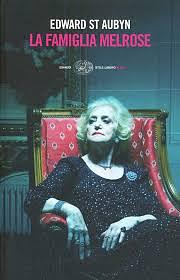Take a photo of a barcode or cover
One of the few books where I don’t mind having a focus in children as characters. Though, usually it’s a gripe when the perspective is solely from a child, but still I’ve not read a book where kids were as interesting as in here (and the first book).
In this mark forward, Patrick is married, though not wholly unhappily, but progressively tumultuously. He and Mary have two kids and their eldest more-or-less embodies the cyclical pattern from the first, where a young, impressionable person internalizes things from their parents. Patrick may not be as horrible as his father in some departments, but he is severely lacking as a father figure and husband, which are certainly inherited and supported by learned behaviours and vices. Which, because of his mother being in terminal care, only become exasperated, as he is unwilling to confront the source of any of his mental ailments, just as his mother confronts the decision to seek end-of-life options.
The prose are still fantastic and the character work improved over the others. No characters are “good”; all of them are interesting.
In this mark forward, Patrick is married, though not wholly unhappily, but progressively tumultuously. He and Mary have two kids and their eldest more-or-less embodies the cyclical pattern from the first, where a young, impressionable person internalizes things from their parents. Patrick may not be as horrible as his father in some departments, but he is severely lacking as a father figure and husband, which are certainly inherited and supported by learned behaviours and vices. Which, because of his mother being in terminal care, only become exasperated, as he is unwilling to confront the source of any of his mental ailments, just as his mother confronts the decision to seek end-of-life options.
The prose are still fantastic and the character work improved over the others. No characters are “good”; all of them are interesting.
(4.5) Nearly makes up for its mediocre predecessors. It's obvious why this was shortlisted for the Booker Prize.
In breaking free from Patrick's intense leading role in the previous books and exploring the wider impact of his unprocessed trauma and abusive behaviour on others, I feel like we get the most clear and developed picture of his character as a whole.
While it helps to have read the previous three books to understand Patrick's character better, I think this is a solid standalone and a feat of writing in its own regard. There are several passages of brilliant prose alongside beautifully articulated ideas on life, death, and parental relationships.
In breaking free from Patrick's intense leading role in the previous books and exploring the wider impact of his unprocessed trauma and abusive behaviour on others, I feel like we get the most clear and developed picture of his character as a whole.
While it helps to have read the previous three books to understand Patrick's character better, I think this is a solid standalone and a feat of writing in its own regard. There are several passages of brilliant prose alongside beautifully articulated ideas on life, death, and parental relationships.
Why invent this family full of miserable characters and then not have them do anything particularly interesting (at least by midway through this novel, where I stopped reading)? I would prefer either exciting jerks or peaceable characters in a dull plot.
Not entirely sure what I thought of this. Took too long of a break in the middle.
Wowza--a lot to unpack. Patrick Melrose has parental issues. Dad has already died in the series. Now we're looking at non-candidate for mother of year, Eleanor. She's given the family retreat in France away to some new age guru, Seamus. PM has chosen a wife, Mary, who is the antithesis of Eleanor, only that means that she is so engrossed in her children that she has zero time or tolerance for PM! Mary is not one-dimensional; she has her own mommy issues to overcome. Also, Mary struggles with trying to be the perfect parent while pining for the solitude that she feels is her core nature. PM does the obvious and turns elsewhere for sexual comfort as he also tries to deal with his mother's deteriorating health. Eleanor has had strokes which cost her the ability to speak. She's also heading toward dementia on a fast bus. When she starts begging PM to help her die, he sees an opportunity to one-up his mother in the care department, but Eleanor does wimp out (as predicted by Mary). At that point, PM seems to find a bit of peace and decides that he's done with Eleanor. That's probably some spoilers, but what amazes me about these books and St. Aubyn is how much gets packed into very short little novels. Again, I understand why there's been such a buzz about them.
The rich are different: after the strident moralising of Ayn Rand, it’s good to skim a book that has no point to offer, or sermon to preach. The objectivist queen’s theory reaches its apotheosis in our very own Patrick Melrose, although Edward St Aubyn’s prose is a quantum leap: light, lipid, every word counting. If this episode finds Patrick in a reflective mood, it’s understandable bearing in mind the dizzying car crashes of the preceding three volumes and his now being a fortysomething father. The belly laughs are fewer and further between, but used more sparingly, Melrose’s acid observations are all the more bitingly funny and seem less like campy vignettes than before. The message is clear: the aristocracy exists to pass on its gene pool and miseries amplified unto the next generation, and there is no escape. As Melrose’s toddler son, bouncing up and down at the end of the novel shrieks: “Do nothing! Do nothing!” Life lessons in two words.
After his breakthrough at the end of Never Mind, Patrick, now married with two sons, is struggling again; with inheritance, his marriage, his mother and parenthood. So sharp, delicious, painful, real, and delightful.
I liked seeing how patrick turned out to be a parent, its an enjoyable novel but i preferred the previous three
Kind of slow, prose verging on purple, but St. Aubyn still impresses me with his ability to articulate difficult, abstract emotions. Also a very interesting exploration into the practicalities and logistics of aging and death. Not so sure about the absurdly precocious children, but I'm inclined to tolerate it because Robert ended up providing a lot of amusement via the discrepancy, which I guess is the point. I'd like to think that the children were also devices to house 3 different Patricks simultaneously.
I just finished the Patrick Melrose trilogy and “Mother’s Milk” and confirmed what I already knew: novels about the British upper class are super boring, (imo)! I guess the ‘dry whit’ of Edward St. Aubyn’s writing was lost on me? Or maybe I just don’t really care about the perils and familial dysfunction of these kinds of characters.







